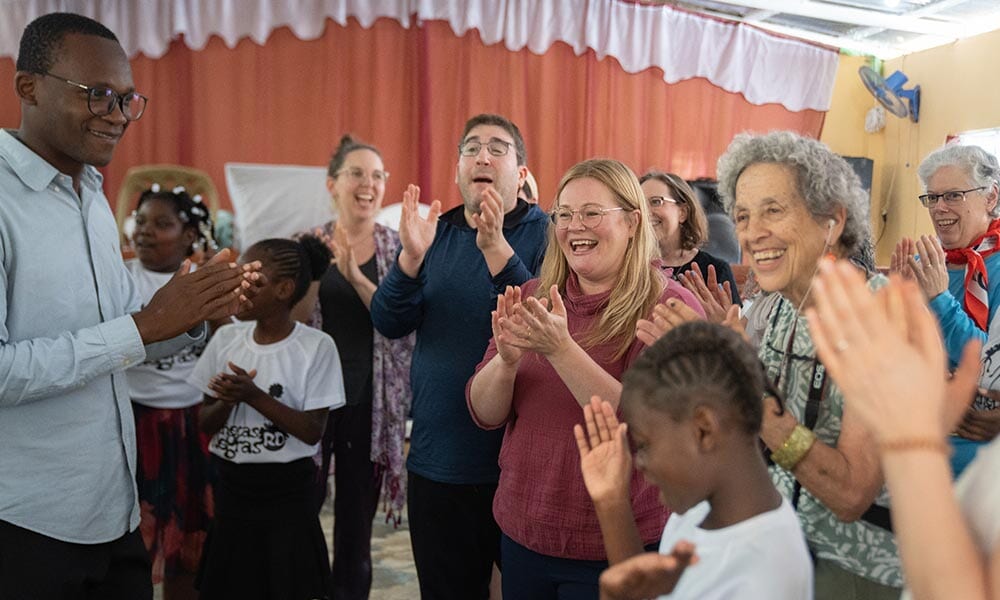Please enjoy this reflection from Rabbi Miriam Terlinchamp, who visited with grantee partners in the Dominican Republic last month as part of AJWS’s Global Justice Fellowship.
In a community room nestled in a batey (a former sugar plantation) in Santo Domingo, three women from Movimiento de Mujeres Dominico Haitianas (MUDHA) tell stories of radical change. Child marriage, generational violence as a norm, and the weaponization of statelessness are tales so personal and painful that the only thing more breathtaking is the tenor with which they are told. The women speak of trauma in matter-of-fact tones, as though their courage and perseverance are a given.
We, the listeners, were visiting the Dominican Republic as part of AJWS’s Global Justice Fellowship, a program designed to educate and train American Jewish clergy to advocate for global human rights. We had spent our week visiting with AJWS partners, exchanging stories, singing, dancing and most importantly, listening. And that warm Friday afternoon, as I listened to the women of MUDHA, I could only imagine how many stories they have shared over the years. The energy it must take to get up each moment, day after day, year after year, fighting the same battles for the women in their community.
When it’s time for questions, Ruth Messinger, who traveled with us and serves as AJWS’s Global Ambassador, speaks up. She says, “I remember when AJWS first started funding your work, and I came to the Dominican Republic to visit you. Now, here we are 30 years later, just a few old ladies still fighting the same fight!”
Dear Reader — try that line again.
Because the way Ruth said it sounded like victory, like hope, like a battle cry. She didn’t say it the way I might say it, with a sense of demoralization that three decades later, we’re still fighting the same damn fight. No, she said it with such pride that she might as well have raised her fist in the air in protest and waved us all out onto the dirt road, marching in solidarity for liberation. The women of MUDHA smiled at their comrade, their Jewish sister from across the waters. Soul to soul, justice worker to justice worker, understanding, inherently that these kinds of fights — of liberty, of women’s autonomy, of human rights for all, are not battles that go away, but rather ones where hope is found in agreeing to start each day by continuing to fight for change.

In our biblical story of the Exodus, we often highlight the leadership of Moses or the might of the Israelite God against Egyptian oppression, forgetting that the chain of liberation started not with those heroes but with a few women who saw an alternate future. When Miriam followed her baby brother in the River Nile and watched a maidservant retrieve him from the river, it would have been natural for her to respond in fear and anger. After all, her baby brother was in the clutches of Pharoah’s daughter, part of the group that systemically oppressed her people. Instead, Miriam sees the humanity in the other women, finding within them a shared value, one that compelled them to save one child at a time.
The rituals of Passover are tools to cultivate moral imagination. We are to find ourselves within the characters, broaden our perspectives, deepen our empathy, and remember that this is not a once-upon-a-time story; this is an ongoing, never-ending story of communal liberation. Our sacred texts teach that the Exodus is cyclical. In every generation, there may be babies thrown into rivers, children forced into marriages, humans robbed of their basic rights, and women rising up, indefatigably changing their corner of the world one interaction at a time.
Rabbi Miriam Terlinchamp is the Executive Director of Judaism Unbound and an AJWS Global Justice Fellow. AJWS’s Global Justice Fellowship is a selective program designed to inspire, educate and train American rabbis to become advocates for human rights.
